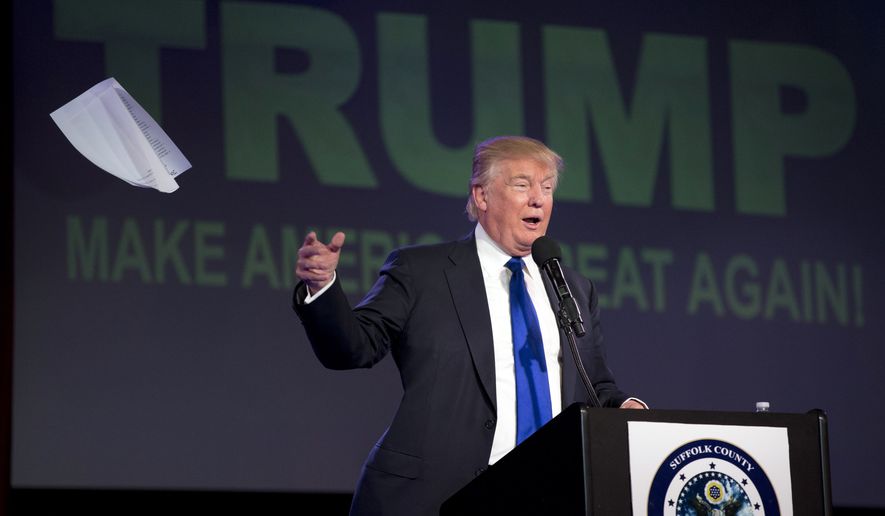Donald Trump is not who GOP leaders imagined when they conducted their autopsy of what went wrong in the 2012 presidential election and laid out their path to retake the White House in 2016, beginning with a gentler approach to women and illegal immigrants.
The post-mortem — dubbed the Growth and Opportunity Project, and written by top Republican National Committee members and advisers — said Republicans needed to make inroads with minorities and young voters to have a hope of winning.
Instead, they’ve ended up with Mr. Trump, whose campaign is banking on turning out millions of disaffected voters who’d given up on politically correct Republicans and Democrats — directly flouting the autopsy’s prescription.
“I suppose we will learn in November if our report was right or wrong,” Ari Fleischer, former spokesman for President George W. Bush and one of the five chief authors of the report, told The Washington Times.
Like Mr. Fleischer, much of the GOP leadership is anxiously awaiting the answer.
They pleaded for months with voters not to pick Mr. Trump, but he has emerged the clear victor from a crowded primary of 17 major candidates, helping spur record turnout and setting a new direction.
Mr. Fleischer said that Mr. Trump’s success “means the votes in this year’s primary went the complete opposite way from our recommendations.”
Now party leaders are looking to try to impose some unity.
Mr. Trump will meet Thursday with RNC Chairman Reince Priebus, who asked for the autopsy report after the 2012 election disaster, and with new House Speaker Paul D. Ryan, who has been reluctant to get behind Mr. Trump, saying the billionaire businessman needs to prove he’s committed to the party’s ideas.
But Sally Bradshaw, another report author who is also a longtime adviser to former Florida Gov. Jeb Bush, said she can’t support Mr. Trump in November. She will instead write someone in on her ballot.
“I am terribly disappointed that it appears our party is going to nominate a bigot and a narcissist,” Ms. Bradshaw said. “I do not consider him a conservative nor representative of the Republican Party.”
The autopsy included recommendations for how the party should handle conservative interest groups, urged against letting presidential campaigns be swamped by paid political consultants, called for the RNC to take more control of the primary process and the debates and said the party needed to tap into data analytics to better target voters.
But the biggest headline from the report was its call for a kinder, gentler rhetorical approach to minorities — and particularly Hispanics.
“We are not a policy committee, but among the steps Republicans take in the Hispanic community and beyond, we must embrace and champion comprehensive immigration reform. If we do not, our party’s appeal will continue to shrink to its core constituencies only,” the report concluded.
The 2016 campaign has challenged that notion.
Mr. Trump kicked off his campaign by proclaiming that Mexico is sending rapists and other undesirable elements to the U.S. He called for a deportation force to oust illegal immigrants and vowed to build a wall on the southwest border — all while insisting Hispanics love him and his policies.
Mr. Trump’s chief competitor, Ted Cruz, struck a similar hard line, vowing to block the very comprehensive immigration plans the RNC autopsy called for. Together, Mr. Trump and Mr. Cruz won more than two-thirds of all votes cast in the GOP primary.
Polls show Mr. Trump is far less popular among a national electorate, however.
A CNN/ORC poll released earlier this month carried some warning signs, showing that 73 percent of nonwhite voters, 70 percent of young voters and 64 percent of women held an unfavorable opinion of Mr. Trump.
For his part, Mr. Trump is confident that he can expand his base of support, saying his numbers will “go way up” in a general election matchup against Hillary Clinton, the likely Democratic nominee.
“You’ll see the numbers change,” he said.
Henry Barbour, another report co-author, agreed that Mr. Trump could benefit from Mrs. Clinton also being a polarizing figure. He said that while the real estate mogul’s tone is not consistent with the autopsy’s recommendations, Mr. Trump has connected with Republican voters and could surprise people by expanding that support.
“I think Donald Trump can take his special direct style into nontraditional Republican neighborhoods — African-American, Asian-American — and talk to the people about how a stronger economy, more secure jobs, stronger national defense is to every American’s advantage,” he said.
“He is a different sort of candidate at time when people want something different,” he said. “He is connecting with voters that think Washington has left them behind. There is a coalition there that could win a general election.”
• Seth McLaughlin can be reached at smclaughlin@washingtontimes.com.




Please read our comment policy before commenting.